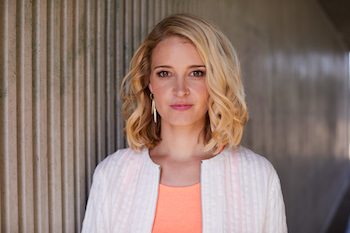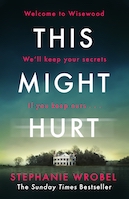
As a reader, I like to roam around the minds of people I’m sure I’ll never understand. I want the author to prove me wrong, to make me empathize with schemers, cheaters, and liars. I find society’s outliers much more fascinating than everyday people like you and me. Keep your protagonist with her heart of gold—I don’t want my main character to make one big mistake; I want her to be a perpetual screw-up.
As a writer, these are the characters that light me up. If I can’t fathom what goes through a certain person’s head, that person is probably a choice candidate to narrate my novels. In my first book, The Recovery of Rose Gold, that meant inhabiting the brain space of a mother with Munchausen syndrome by proxy; it required playing the role of a narcissist and manipulator. In my second novel, This Might Hurt, it involved diving deep into a cult and understanding not only what a cult leader is thinking but also the members.
When I set out to write This Might Hurt, I wanted to answer two questions: why do people join cults, and why do people start them? Before I did my research and began writing, I knew very little about the psychology of cults. Like most people, I was primarily engrossed by the bizarre customs, rules, and clothing. No matter how many documentaries I watched or novels I read, I kept coming back to the same simple question: why?
I couldn’t picture myself or anyone I knew falling victim to one of these communities, but that was only because art has tended to gloss over the psychology of cults. True crime docs often neglect to depict the beginning stages, when the organization is functional and a force of good in the world. As Deborah Layton points out in her memoir, Seductive Poison: A Jonestown Survivor's Story of Life and Death in the Peoples Temple, people don’t join cults. They sign up for churches and political groups and social clubs. They take part because they’re searching for something: belonging, purpose, a higher power.
For these very reasons, one of my three protagonists in This Might Hurt, Kit Collins, joins Wisewood, a fictional self-improvement community on a private island off the coast of Maine. Kit is completely disenchanted with and disengaged from “real life”; she wants to do something dramatic to shake up her routine. When she arrives at Wisewood, she looks around the island and realizes what she has in common with her fellow guests—hope. Over and over, my research confirmed this humble but powerful truth: people who join cults are hoping for something more out of life.
Once I understood that truth, imagining the mind of a cult member was not so difficult. These folks are not naïve, foolish or brainless; they’re unlucky. They signed up for the types of groups that you and I have joined half a dozen times, but theirs took a turn for the worse. They missed a warning sign or two, and in many cases, found themselves unable to leave for financial reasons. The cult gave them jobs, food, and/or shelter, making it near impossible to walk away. They went in with the best of intentions. They dared to hope.
Inhabiting the mind of a cult leader proved to be more of a challenge. Again, I turned to research. Many, but not all, leaders had unstable childhoods with neglectful or abusive parents. As adults, these leaders crave the spotlight and have the charm to hold onto it. They’re typically narcissists—and here, research from my first novel came in handy. I had worn the shoes of a narcissist before in Patty Watts. Since I knew her tactics and tricks, I applied some of them to the new narcissist in my life, Wisewood’s mysterious leader called Teacher.
Patty and Teacher have more than narcissism in common. They’re both charismatic, unpredictable, and cunning. They crave an audience; they seek approval. They lie to get what they want. The most difficult part in sketching convincing portraits of these characters was not the lying or manipulating—it was the charisma! As a classic introvert, I had no idea how these people drew others in, seemingly without effort. Those passages full of magnetism were the ones I had to rework the most.
I mentioned three protagonists in This Might Hurt: a cult leader, a cult member, and so who is the third? Natalie Collins is Kit’s older sibling, trying to pull her sister out of something she believes to be dangerous. Natalie is you or me. She is the levelheaded one, the character who dutifully works her nine-to-five job and pays her rent on time. She emphatically does not flit off to strange islands or sign up for self-help groups.
Can I be honest about something? Though Natalie behaves the most like I do day to day, I found her the hardest to write. She doesn’t have the same burning hunger the other two possess. She’s unwilling to play with fire. In the real world, that sensibility is key to a grounded, productive life. But in fiction? Give me the perpetual screw-up any day of the week.

This Might Hurt (Penguin Michael Joseph £14.99 Hardback & eBook) is out on 3 March